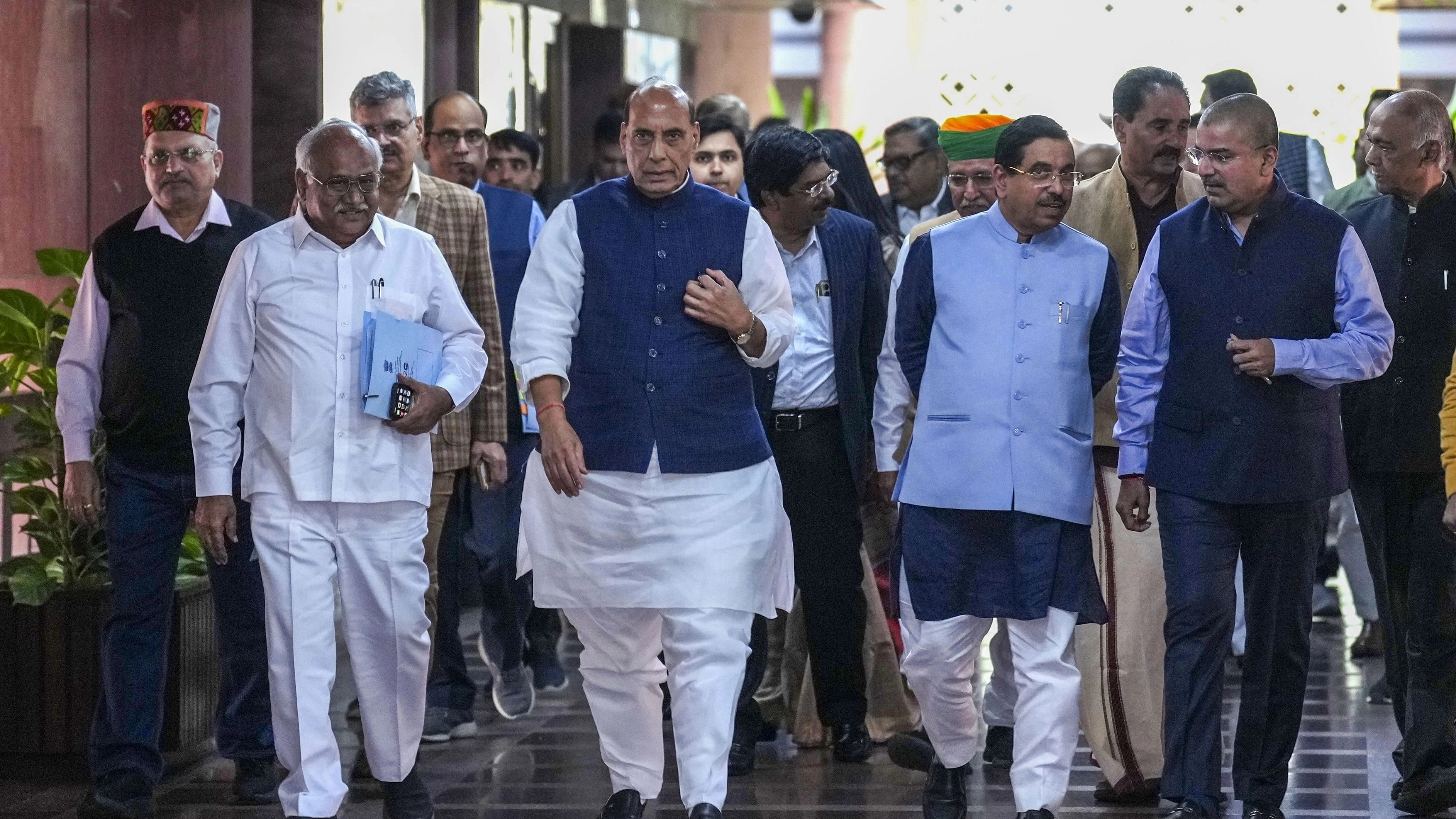
Union Defence Minister Rajnath Singh, Union Minister of Parliamentary Affairs, Coal and Mines Pralhad Joshi, Union Minister of State for Law and Justice, Parliamentary Affairs and Culture Arjun Ram Meghwal and others leave after a meeting of the Minister of Parliamentary Affairs with floor leaders of political parties at the Parliament House before the commencement of the Winter Session, in New Delhi, Saturday, Dec. 2, 2023.
Credit: PTI Photo
New Delhi: The government and Opposition are all set to lock horns in the Winter Session of Parliament – the “last full-fledged” one before the next Lok Sabha elections – starting Monday, a day after the results of Assembly elections to four states will be out.
The session – spread over 15 sittings till December 22 – will see the government attempting to push 19 bills and two financial items, while the Opposition is likely to insist on discussions on contentious issues like Manipur ethnic violence, Governors’ role and Palestine, indications of which came during the customary all-party meeting on Saturday.
Parliamentary Affairs Minister Pralhad Joshi told reporters that the government has assured during the meeting that it is ready for discussion on all issues but the Opposition must ensure an “enabling environment” for the debates to take place.
“The government is fully ready for a structured debate and has requested the Opposition to let the House function smoothly. The government has taken the Opposition's suggestions positively,” he said after the meeting.
Opposition leaders indicated that they are unlikely to go to the extent of disrupting the entire session, which Joshi described as the “last full-fledged session” of this Lok Sabha. In January-February, Parliament will meet again for a shorter period when either a vote on account or interim budget will be presented.
The proceedings are likely to start on a stormy note on Monday with the Ethics Committee scheduled to table the report recommending expulsion of Trinamool Congress MP Mahua Moitra on 'cash for query' allegations, with the Opposition all set to question it.
Trinamool Congress’ representatives Sudip Bandhyopadhyay and Derek O’Brien demanded that there should be a discussion on the issue. It demanded that reports of Parliamentary committees should not be made public until they are tabled like in the case of the report on Mahua.
Other Opposition leaders too supported Trinamool Congress arguing that using majority, the ruling BJP should not take action against Opposition MPs. They also referred to the suspension of two AAP MPs Sanjay Singh and Raghav Chaddha.
The session will also see the government taking up three bills to replace Indian Penal Code, Criminal Procedure Code and Evidence Act for passage but it could see the Opposition objecting to its Hindi nomenclature as some parties made it clear that they would oppose it, claiming it to be an imposition of Hindi.
Sources said RSP MP N K Premachandran told the leaders at the all-party meeting that the Hindi nomenclature of the three bills appeared to be an “insult to South Indians and indirect imposition of Hindi”. As he demanded reconsidering renaming the bills, he got support from parties like the Congress, DMK, CPI(M) and CPI among others.
Trinamool Congress representatives argued that the three bills should not be rushed through, as they have “major ramifications”.
Leaders like Premachandran, CPI(M)’s Elamaram Kareem, CPI’s P Sandosh Kumar and National Conference’s Hasnain Masoodi also sought a thorough discussion on the conflict in Palestine involving Israel and Hamas.
“Palestine should not be seen as a Muslim issue. It is a huge human rights issue,” Sandosh Kumar said, as he also received support from parties like Samajwadi Party and DMK among others. Kareem said the Palestine issue is discussed across the globe and there is a need for the government to spell out its stand in Parliament.
Opposition leaders also demanded discussion on Manipur violence saying that seven months have passed but there is no solution to it. They also raised the issue of the role of Governors’ in Opposition-ruled states as well as the need for restructuring the Centre-state financial relations.
The Opposition leaders further demanded that there should be enough time for short-duration discussions and calling attention motions. Leaders of smaller parties like JMM’s Mahua Majhi demanded that more time should be allotted to them to participate in debates.
